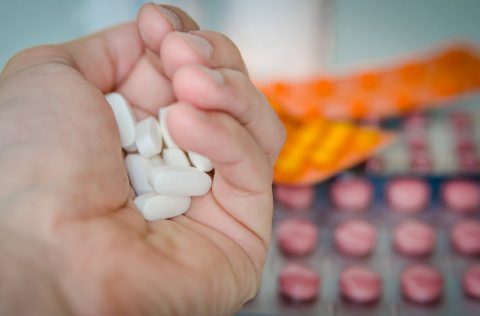Bad breath, we all know what it is and we’ve all been embarrassed by our own from time to time. But what causes it? Knowing and understanding what causes bad breath can help you prevent it and the embarrassment that often accompanies it. Read on to learn more about what causes bad breath and quit being afraid of getting close.
What Causes Bad Breath?
Also called halitosis, bad breath can be caused by a number of issues.
Food. Some of the foods we eat can give us temporary bad breath. Garlic, onions, coffee, spicy or fragrant foods can leave your mouth less than fresh. Brush your teeth, chew sugar-free gum, or use mouthwash for a burst of freshness.

Tobacco. Smoking and tobacco use not only cause bad breath, they can create oral cancers, stain teeth and irritate your gums. Consider a tobacco free lifestyle to reduce the negative effects.

Dental issues. Bad breath can be caused by dental issues such as gum disease or cavities. Crowded teeth or ill-fitting dental appliances can also cause bad breath. See your dentist to rule out any oral care issues as a culprit.
Bacteria. Without proper brushing, flossing, and regular visits to the dentist, bacteria is not being removed from your mouth. The build-up of this sticky bacteria can lead to bad breath. By following the ADA recommendation of brushing twice a day, flossing daily, and routine visits to the dentist, you can keep bacteria in check.
Dry mouth. Lack of saliva creates dry mouth, which may be a side effect of medications, smoking, or mouth breathing or it could be a symptom of an underlying health concern. Talk to your dentist about dry mouth for the best remedies for both dry mouth and resulting bad breath.
Disease. Sinus infections, tonsillitis, respiratory issues and even diabetes can result in bad breath. Your doctor may prescribe medication for these conditions which may make dry mouth, and resulting bad breath worse. Talk to your doctor if your side effects are problematic.

Addressing Bad Breath
In order to address bad breath, you need to understand what’s causing it. The best way to discover the underlying reason for bad breath is being honest about your lifestyle and habits with both your dentist and doctor to create the best approach to getting rid of bad breath. Many times bad breath can be avoided by living a tobacco free life, keeping a good oral health care routine (brushing twice a day and flossing daily) and of course seeing your dentist at least twice a year.
How Do You Prevent or Get Rid of Bad Breath?
Bad breath is something we all want to avoid, especially while speaking in social situations. Luckily there are a few things you can do to reduce the chance of developing a bad breath, also referred to as halitosis. While there’s no cure for bad breath, you can help to reduce the smell if it does occur.
Main Causes of Bad Breath
There are several causes of bad breath, but luckily most of them can be avoided.
High Levels of Bacteria in the Mouth
Bacteria in the mouth increases due to poor dental hygiene. If you don’t brush twice daily and floss, food particles remain in the mouth and the bacteria numbers increase. The bacteria releases sulphur compounds which make breath smell. High bacteria levels and poor oral hygiene can cause tooth decay and infections around the teeth known as periodontitis, which can also lead to bad breath.
Smelly Foods
The most obvious cause of bad breath is strong smelling foods. Foods such as onion, garlic and tinned tuna can give you bad breath. Even dairy foods can cause bad breath due to the bacteria in your mouth feeding off the amino acids in milk, cheese and cream. Some people are more susceptible than others with the odour staying on their breath for longer.
Smoking and Drinking Alcohol
Other obvious causes of bad breath are smoking and consuming alcohol. Smoking causes odour in the mouth and breath. Drinking alcohol can also cause bad breath particularly if the alcoholic drink has a strong smell, such as red wine and spirits.
Dry Mouth
Some people have a dry mouth with little saliva. It’s saliva that helps remove food particles and reduce bacteria in the mouth. When little or no saliva is produced, the mouth becomes dry and bad breath is likely to result. A dry mouth is what usually causes ‘morning breath’, but many people suffer from a dry mouth throughout the day. The most common cause for this is some prescription medications turn off or reduce saliva production.
Bad Breath and Braces
When you have braces, you’re at a slightly greater risk of bad breath. Maintaining oral hygiene while you have braces is important in avoiding bad breath, particularly as braces create plenty of crevices for food to become lodged and bacteria to thrive. Brushing after each meal can help to ensure that your teeth and braces are free of bacteria and food. no food caught in your braces. If you can’t brush after lunch, rinse your mouth thoroughly. Flossing twice daily will remove food and plaque caught between teeth.
How to Clear Bad Breath
There are a few things you can do to protect yourself from bad breath. Most of them are simple tips that can be combined for extra protection.
Daily Oral Hygiene
The most simple yet effective way of reducing the risk of numerous dental problems is to brush and floss twice a day. Use a soft bristle brush and take your time to get into all the tiny crevices in the mouth where bacteria and plaque can hide. Poor oral hygiene has the potential to cause conditions such as gingivitis, which can also cause bad breath.
Mouthwash
If you want extra protection against bacteria, try a mouthwash after brushing and flossing. The benefit of a mouthwash is that it can get into the tiny places between teeth and around the brackets and wires that you may miss with the brush.

